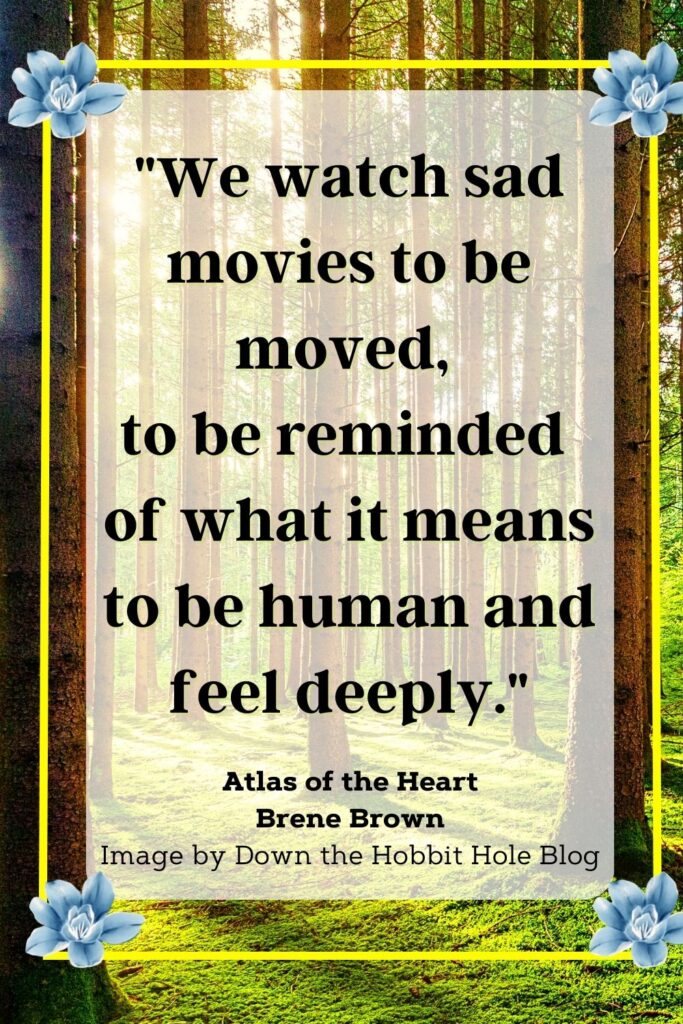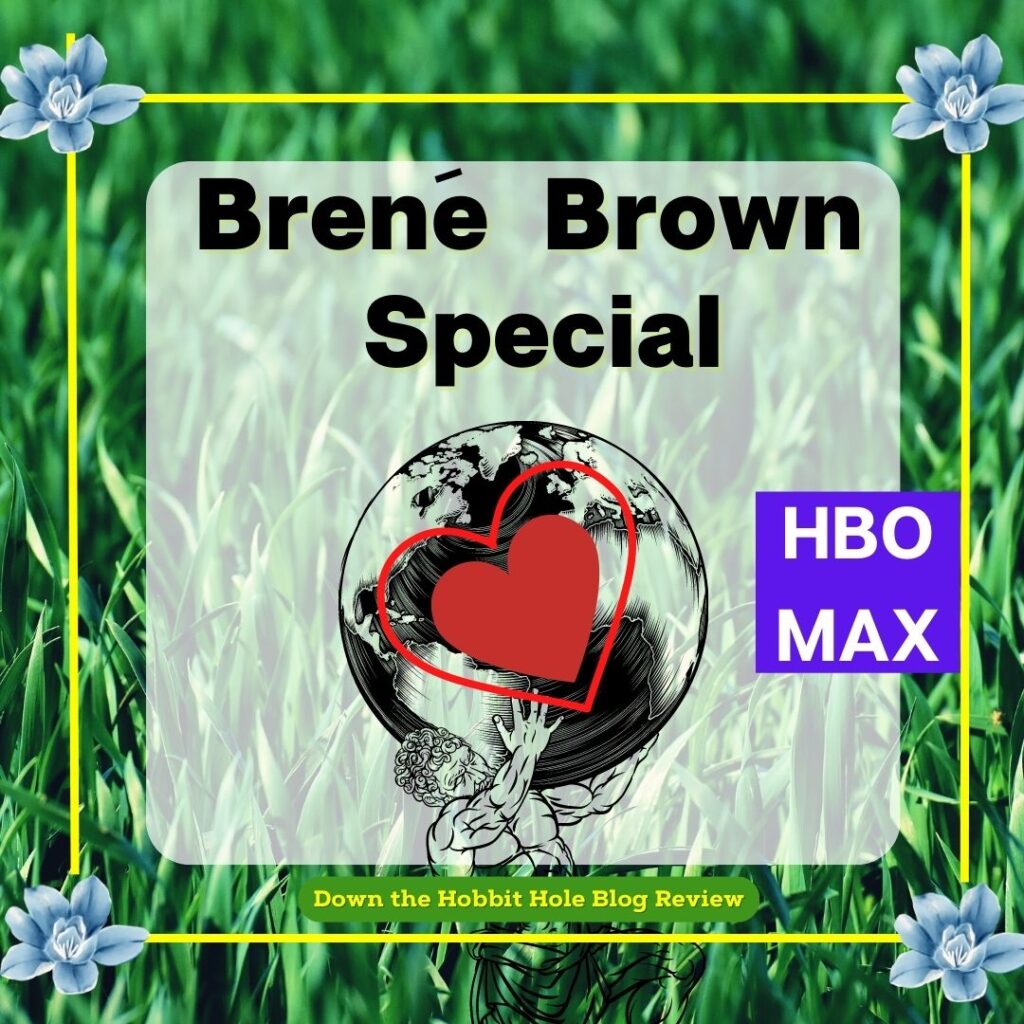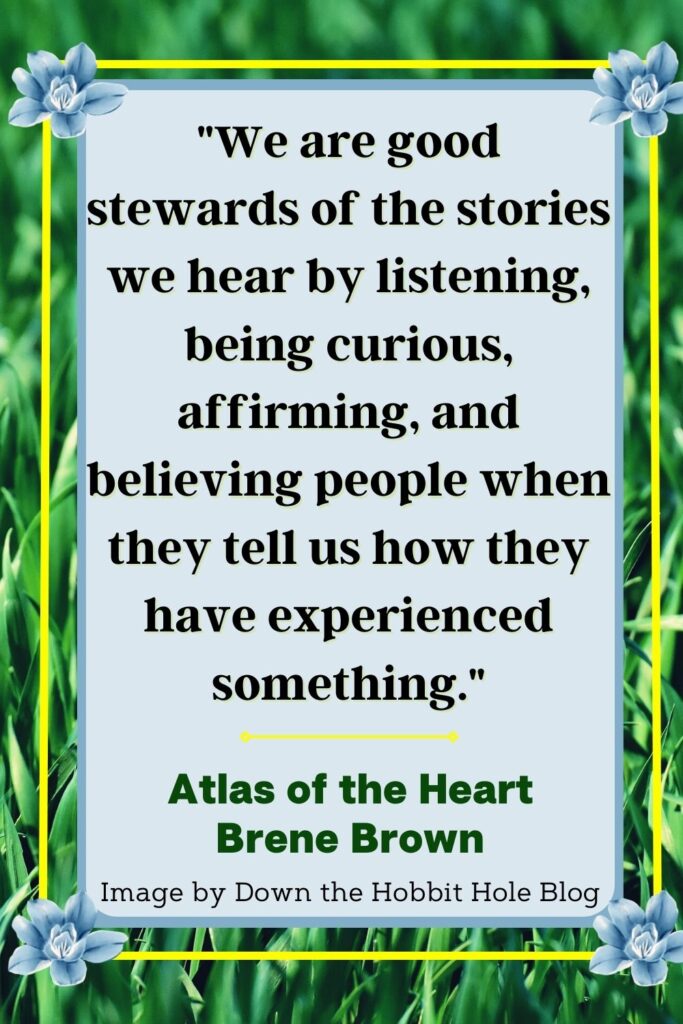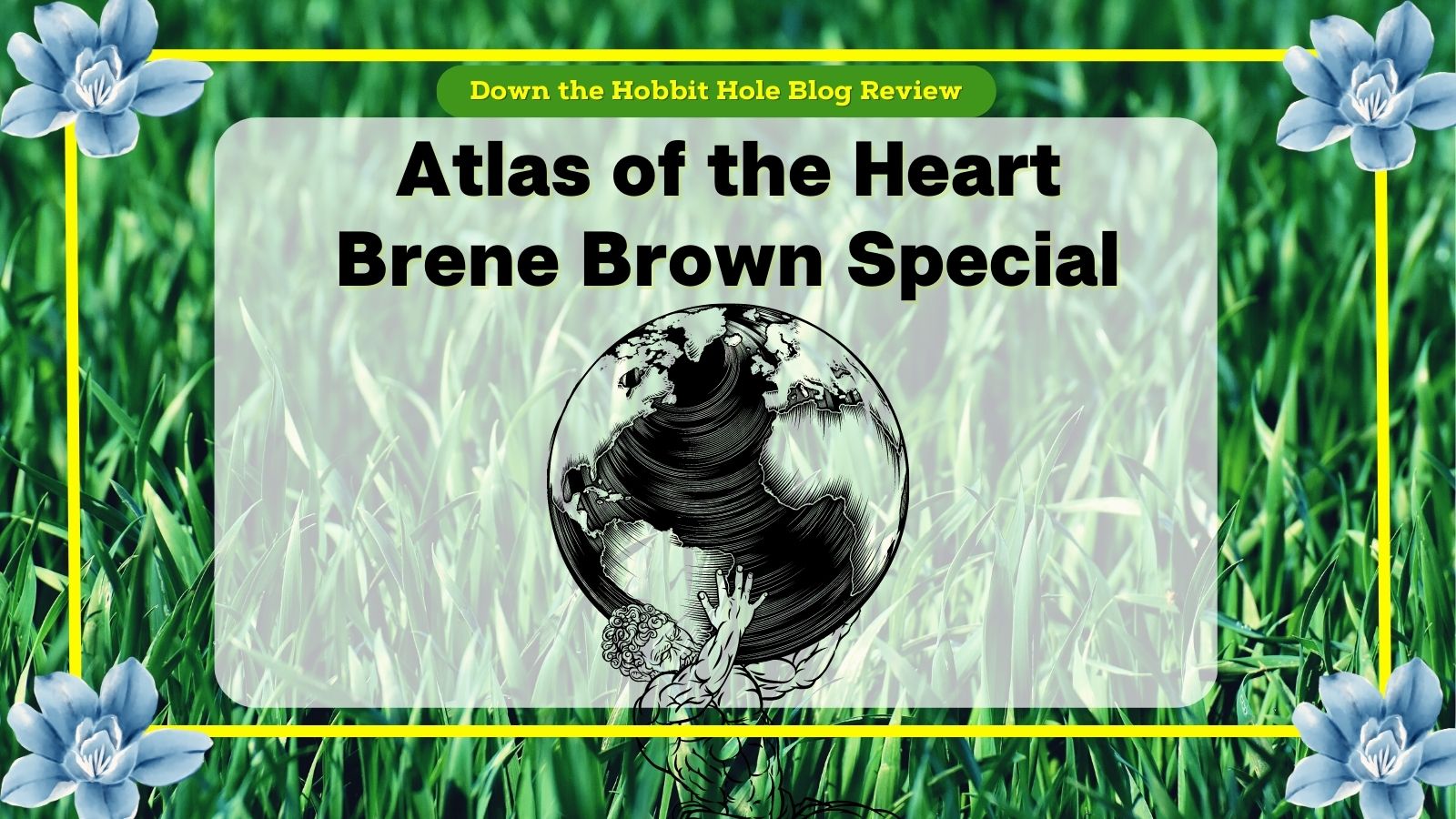Lessons from Atlas of the Heart written by the Elf and the Ent, Dec 2022. This post contains affiliate links, you can find out more on our policies page or in the disclaimer at the bottom of the blog.
Know Before You Watch
Movie: Brene Brown: Atlas of the Heart
Rating: TV-14
Genre: Psychology, Self-Care
Length: 5 forty minute episodes
Age suggested: 13 and up
Release Date: March 31st, 2022
Warnings: This is a fairly deep, psychological conversation. So, younger viewers may need guidance and processing help. This is designed for older viewers and the language does reflect this. Some swear words and trauma are discussed openly.
Quick Atlas of the Heart Summary
This Brene Brown: Atlas of the Heart HBO Max special is the culmination of all of the research and studies of Brene and her team. Based on her book of the same name, this is a five episode special that does a deep dive into human emotions, with a specific focus on the interactions between each other in relationships (work, friendships, romantic, and otherwise).
In Atlas of the Heart, Brene Brown and her team teach us about 87 different emotions. 30 of them are gone through in the HBO Special with stories and media clips. The main question this research asks is ‘How do we cultivate meaningful connection and find our way back to ourselves and each other?’
Here are the names of the five episodes, now streaming on HBO Max.
-Episode 1: The Language of Emotion and Human Experience
-Episode 2: Places We Go When Things Are Uncertain or Too Much
-Episode 3: Places We Go When We Compare
-Episode 4: Places We Go When Things Aren’t What They Seem
-Episode 5: Places We Go With Others – And The Framework for Meaningful Connection
Continue reading for our Lessons from Atlas of the Heart HBO Special
Lessons from Atlas of the Heart HBO Special
1) Knowing the Language of our Emotions is Crucial
We have really limited language for our emotions and it really impacts how we process things. We need to understand what we are feeling so that others can help and so that our brains can help ourselves process and feel the right thing. 2 very impactful quotes from this section…
~“We process neurological pain the same way as physical pain.”
~”How is your language becoming a self-fulfilling prophecy for what you experience? How are you protecting yourself in ways that are going to ensure that you never get what you really want, which is vulnerability?”
2) If we are not aware of ourselves we cannot truly connect with others
”I need to be connected to myself, in my own body, and learning what makes me work. This is how I start to develop the grounded confidence I need to move through the world and cultivate meaningful connection with others.” We need to be connected to and aware of ourselves. It impacts how we connect and relate to others. How much do we numb our feelings and cut off others instead of feeling deeply or allowing others to feel deeply?

3) There are Different Kinds of Anxiety and Grief. And we can’t Always Just Deal With Them on Our Own.
1 in 3 adults struggles with generalized anxiety and it’s a good thing to seek help with. This is a chemical imbalance that we need help balancing. Then there’s grief, which is similar in that it is an imbalance and there are different forms.
Something I have experienced this year (that this book gave me the language for) is ambiguous grief. According to chapter 6 of the book, “Disenfranchised grief is not openly acknowledged or publicly supported through mourning practices or rituals because the experience is not valued or counted as others as a loss.” Things like divorce, suicides, miscarriages, sexual assaults, abuse, adoption and foster care. “Grief is complex and human. When we can name it, we can make space for it.”
4) There are Two Types of Comparison and Both Can Hurt You
This blew my mind. How often are we told not to compare?! Or think we can read another person? Turns out we cannot read people. Humans are too complex for us to do that. Speaking of complex, we are constantly comparing and it’s not something we can just choose not to do. But we can be aware of our thoughts and choose how to continue the thoughts.
Continue reading for more of our Lessons from Atlas of the Heart

5) Be aware of your light.
I loved the story she shared talking to her daughters about being a candle protector. Be someone who celebrates and protects other’s light. Protect your own light. In the Netflix special, A Call to Courage, Brene Brown talks about not stewing in foreboding joy. That fear of never letting yourself feel the highs or lows fully. Thinking the other shoe is always about to drop. We can enjoy joy. We can feel deep sorrow and keep living. Joy is usually accompanied by a little pain, just like sorrow can also be tinged with smiles.
How can you best protect your own light? And also protect and encourage the lights around you?
6) Thinking and feeling as a group is easier than processing stuff individually
”When we are faced with information that challenges what we believe- our first instinct is to make the discomfort, irritation, and vulnerability go away.” (Chapter 5) There’s been a lot of challenging new information over the past few years and we’ve seen a lot of pushing away that discomfort. When people are wanting discomfort to go away together, or celebrating the pain of others together, it creates a false sense of fellowship. “It’s not hard to whip people into a frenzy using a nostalgia when we are collectively longing for something simpler.” She’s got a great article here on dehumanization. But it’s a lot easier than we assume to dehumanize people, to fall into a group frenzy of despising others.
I also loved the Ted Lasso reference she made- we went back and looked for it. During a dispute between Jamie and the rest of the team, something bad happens to Jamie. This leads one of the teammates to feel happiness at Jamie’s misfortune. Sure enough- Ted says ‘not on my team!’ Schadenfreude is “Pleasure of joy derived from someone else’ s suffering or misfortune. The result of a fragile ego and is very seductive in group settings.” In season one, episode six if you want to watch it.
Keep reading for more lessons from Atlas of the Heart
7) We use several emotive words incorrectly.
A lot of the basis of Atlas of the Heart rests on the fact that we don’t use emotive words correctly. And that has a big impact on us and others. The most surprising were the words we use super often! But often they’re used incorrectly. Like envy and jealousy. Jealous is stronger- fearing loss. Whereas envy isn’t mean. Wishing you could also go on the trip, not wanting to take it away from them.
She also emphasized that “Sarcasm in Greek means to tear flesh. Use it thoughtfully. Really watch it with kids. Stay away from it in written communication.” Which was impactful. Why do you think we tend to use sarcasm without considering its effect on the person we directed to?

8) Empathy Requires Distance and Boundaries
This one was HUGE for me. To really have empathy instead of just compassion or self protection, you have to have distance and boundaries. Distance, so that you have perspective on the situation. And boundaries to not make the situation about yourself. When someone comes to you and you want to empathize with them, your response matters. Getting caught up in the situation or feeling the same feelings they are is not empathy. It is also not empathy to not be able to say no. EG: if someone is drowning you cannot let the drowning person pull you down with them without any floatation devices, it’s just not helpful.
The other thing that surprised me here was that all advice giving is criticism and control. Not that it cannot be good, or asked for- it can be. But giving advice is saying ‘you are not doing this the way I think is the correct way.’ And with that in mind we need to be very careful about the advice we give out. But also about the advice we allow in. In many cases, rather than giving advice, a person simply wants you to be present and feel with them. Lastly, the idea of asking permission to give advice is so helpful. It will either let you know that they really aren’t searching for advice at that moment or allow them to open up to listening and further discussion.
9) The meaningful connection theory
“Meaningful connection is a daring and vulnerable practice that requires grounded confidence, the courage to walk alongside others in story stewardship.”
Vulnerability is being in state in which you open yourself to attack or hurt, but it is required when we are trying to correctly identify and name our emotions. It’s also a necessary component to forming meaningful relationships with ourselves and with others. And once others have identified their own feelings and they tell us about them, we have to resist the urge to fix it, brush it aside, or to discount their emotions. Most people have a lot of surface level friendships and acquaintances, but meaningful connections are different because of that level of vulnerability.
10) The importance of personal stories.
I could write a whole post on just this section, but instead I’ll post two of Brene Brown’s quotes for you to read here. This is so incredibly important for us to acknowledge and live out.
”Story stewardship means honoring the sacred nature of story. The ones we share and the ones we hear. And knowing that we’ve been entrusted with something incredibly valuable…. We are good stewards of the stories we tell by trusting them to the people who have earned the right to hear them… We are good stewards of the stories we hear by listening, being curious, affirming, and believing people when they tell us how they have experienced something. When we are reckless with people’s stories we diminish our own humanity”
“We don’t walk in other people’s shoes. And to pretend we do causes pain. We have to listen to people’s experiences in their own shoes. Believe them and believe them when that does not reconcile with out own experiences.”
What’s the biggest lesson you learned from Atlas of the Heart?
Thanks for checking out our Lessons from Atlas of the Heart the Brene Brown Special. Before you go, check out these other posts:
-Our top family friendly HBO Max Streaming Suggestions
–Brene Brown Call to Courage Netflix Special Discussion Guide
-5 Lessons from the Meghan and Harry documentary on Netflix
–Lessons from Becoming Book and Netflix Special
Down The Hobbit Hole Blog and this Thanks for checking out our Lessons from Atlas of the Heart Review use affiliate links. We only link products we think you’ll like and you are never charged extra for them. As Amazon Associates, we earn from qualifying purchases at no additional cost to you. We also use cookies to gather analytics and present advertisements. This allows us to keep writing discussion questions and telling ridiculous dad jokes. Find our other reviews with discussion questions here. Our posts about faith here. And our posts about family stuff here.
